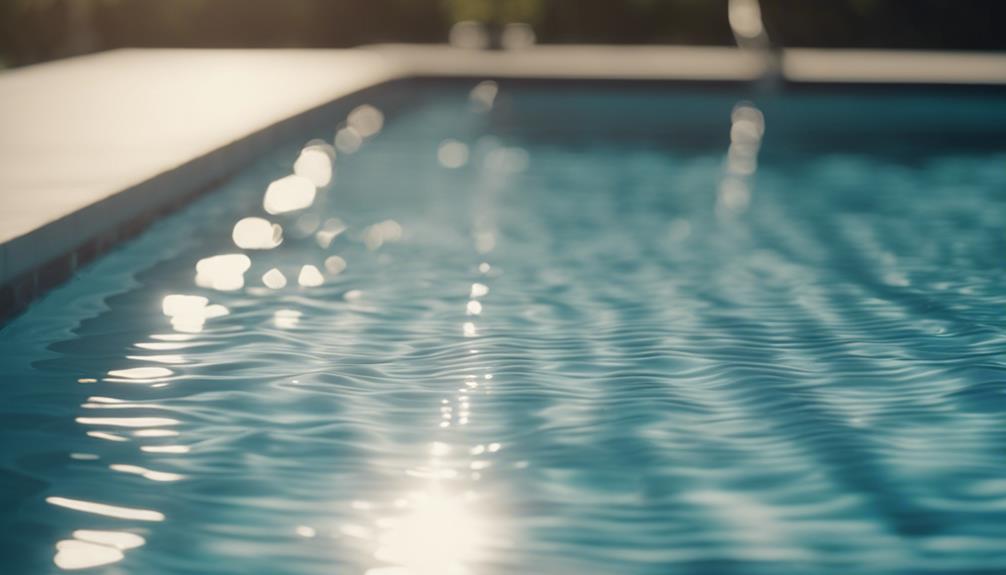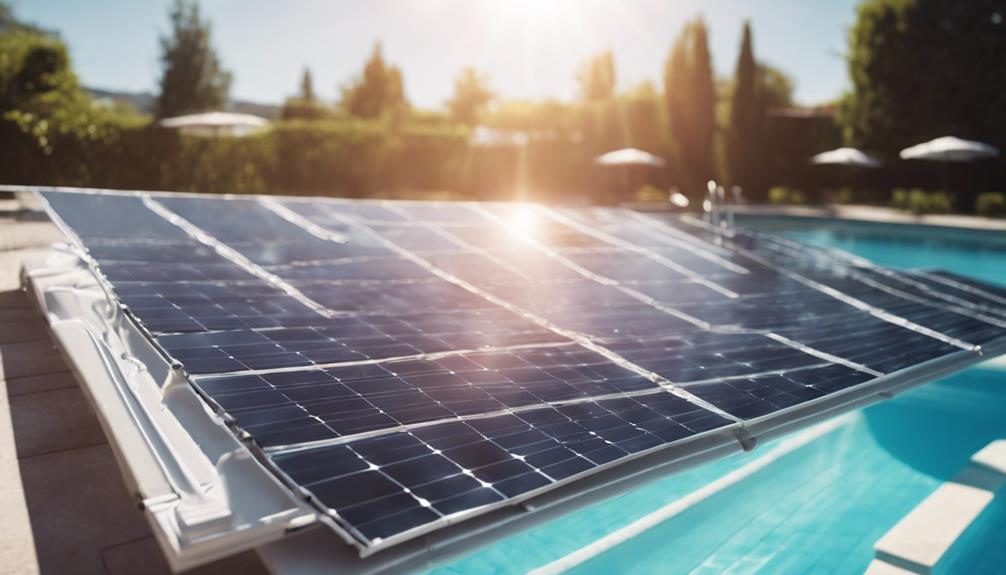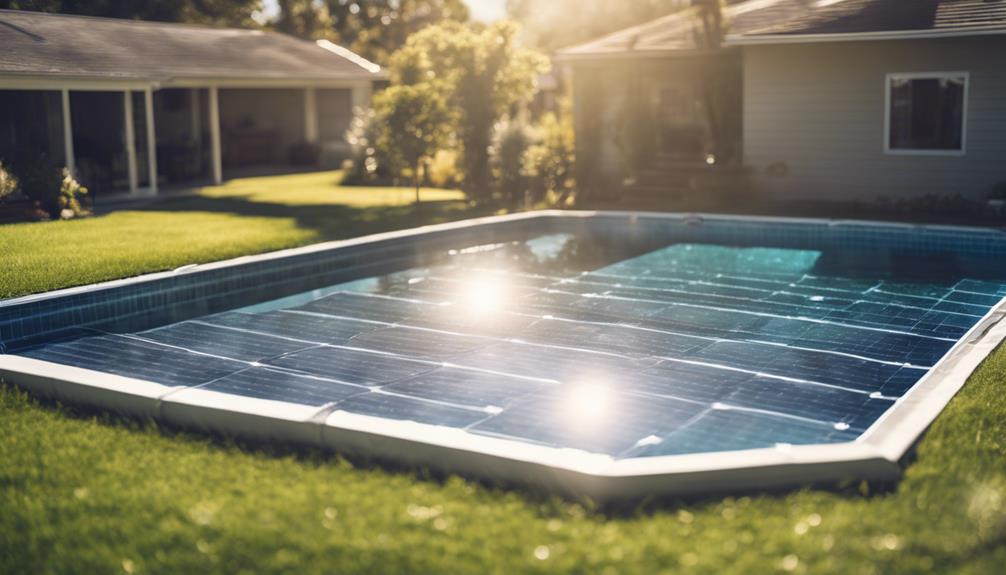Efficiently heat your pool with heat pumps – choose air or ground source for energy efficiency. Solar systems are eco-friendly and cut costs long-term. Solar blankets are a simple and effective way to trap heat. To maintain warmth, shield your pool from gusts with windbreaks or covers. Shoreline Pools offers tailored solutions for best heating.
Key Takeaways
- Consider heat pumps for efficient pool heating, providing 3.5-4.5 times more heat energy than electricity consumed.
- Explore cost-effective solar heating systems to reduce energy costs and minimize carbon footprint.
- Use solar blankets to collect sun's heat, heating pool water efficiently by trapping warmth.
- Shield pool from wind effects with windbreaks or natural barriers to maintain ideal temperature.
- Contact Shoreline Pools for expert consultation on energy-efficient pool heating systems and maintenance.
Consider Heat Pumps
When contemplating efficient ways to heat up your swimming pool, considering heat pumps is a prudent choice. Heat pumps, available in air source and ground source types, offer significant benefits. They can provide between 3.5 to 4.5 times more heat energy than the electricity they consume, making them a cost-effective option in the long run.
Air source heat pumps typically range from $500 to $1,500 with monthly operational costs falling between $100 to $200. On the other hand, ground source heat pumps are more expensive due to installation requirements, which involve digging out an area for placement. Despite the initial investment, heat pumps are a reliable and efficient way to keep your pool at a comfortable temperature throughout the swimming season.
Explore Solar Heating
Consider the cost-effective and environmentally friendly option of solar heating for your swimming pool. Solar heating systems work by directing pool water through valves to solar collectors, where the water is heated using the sun's natural warmth.
This method not only helps reduce energy costs but also minimizes the carbon footprint of heating your pool. Installation costs for solar heating typically range from $2,500 to $4,000, making it a long-term investment that pays off in energy savings.
Opt for Solar Blankets

Solar blankets, a simple yet effective pool heating solution, collect heat from the sun and transfer it to the pool water. These blankets, when placed over the pool water's surface, act as a barrier that traps the sun's heat, preventing it from escaping and keeping the water warm.
Despite being slightly cumbersome to handle, solar blankets have proven to be 95% efficient in heating pool water according to a study. However, it is essential to remove the blankets before swimming and replace them afterward to maximize their effectiveness.
Shield From Wind
To maintain ideal pool water temperature and minimize heat loss, it is important to shield your pool from the effects of wind. Wind can increase water surface evaporation and disturb the pool water's surface, causing heat loss.
Here are four ways to shield your pool from the wind:
- Install a windbreak or fence around the pool area to reduce wind exposure.
- Use tall shrubs or trees strategically planted to act as a natural wind barrier.
- Consider installing a retractable pool enclosure to protect the pool from wind.
- Use pool covers or solar blankets when the pool is not in use to prevent heat loss due to wind exposure.
Contact Shoreline Pools

For assistance with optimizing your pool heating solutions, feel free to contact Shoreline Pools at (203) 357-1544 to schedule an appointment.
| Shoreline Pools Services | Contact Information |
|---|---|
| Pool Heating Consultation | Phone: (203) 357-1544 |
| Energy-Efficient Solutions | Email: info@shorelinepools.com |
| Customized Heating Systems | Website: www.shorelinepools.com |
| Maintenance and Repairs | Address: 123 Poolside Ave, Stamford, CT |
Shoreline Pools offers expert advice on optimizing pool heating systems, ensuring cost-effective and efficient solutions tailored to your needs. Reach out to their team for professional guidance on enhancing your swimming experience.
Frequently Asked Questions
Can Solar Heating Work Effectively in Colder Climates?
Solar heating can be effective in colder climates by harnessing the sun's energy to warm pool water. While initial costs may be higher, solar heating systems are a cost-effective and eco-friendly solution for maintaining pool temperature even in colder regions.
How Do Solar Blankets Impact Pool Water Chemistry?
Solar blankets, like a warm embrace, efficiently heat pools by trapping sunlight and transferring it to the water. While aiding in temperature rise, they also reduce evaporation, chemical loss, and debris accumulation, promoting a balanced pool water chemistry.
What Maintenance Is Required for Ground Source Heat Pumps?
Maintenance for ground source heat pumps includes regular filter replacements, monitoring refrigerant levels, inspecting ductwork, and scheduling annual professional inspections. Additionally, ground source heat pumps require periodic ground loop maintenance to maintain peak performance and efficiency.
Do Solar Blankets Need to Be Removed Daily for Optimal Heating?
Like a diligent gardener tending to plants daily, solar blankets should be removed each day for best heating. This practice allows maximum sun exposure to warm the pool water efficiently, ensuring a comfortable swimming experience.
How Can Wind-Resistant Pool Covers Help Retain Heat?
Wind-resistant pool covers act as barriers against wind, minimizing water surface evaporation and heat loss. By shielding the pool from wind exposure, these covers help retain the pool water temperature, creating a more energy-efficient heating solution.
Conclusion
To sum up, selecting the appropriate heating method for your swimming pool is essential for extending the swimming season and maximizing enjoyment.
According to the Department of Energy, heat pumps can be up to 300% more efficient than traditional electric resistance heaters, providing significant energy savings.
By considering options such as heat pumps, solar heating, solar blankets, and wind shielding, you can effectively heat your pool while minimizing costs and environmental impact.










